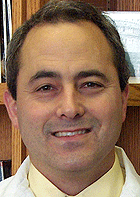Anthony J. Muslin, M.D., has been named the Oliver M. Langenberg Distinguished Professor of the Science and Practice of Medicine.
The professorship was established by the Edward Mallinckrodt Jr. Foundation in recognition of Oliver M. Langenberg’s outstanding contributions to the foundation’s success. Langenberg serves as the chairman of the foundation’s board.

Langenberg grew up in St. Louis and graduated from Princeton University in 1935. After World War II, he worked at Gaylord Container and then moved to Mallinckrodt Chemical Co. In 1961, Langenberg began a new career with A.G. Edwards & Sons Inc., where he helped pioneer its overseas operations and saw the company develop from 12 branch offices to its current 700. At age 94, Langenberg continues at A.G. Edwards as senior vice president of institutional sales.
The Mallinckrodt Foundation, established by Edward Mallinckrodt Jr. in 1953 to further medical education and research, has provided research support for 28 faculty members at the School of Medicine since 1991. Its grants to the medical school have totaled about $10 million. Langenberg said he hopes the funding provided by the Mallinckrodt Foundation will someday lead to a Nobel Prize for one of the many scientists it has supported over the years.
Chancellor Mark S. Wrighton and Larry J. Shapiro, M.D., executive vice chancellor for medical affairs and dean of the School of Medicine, announced Muslin’s appointment.
“The University has gratefully benefited from the unwavering commitment of the Mallinckrodt Foundation to advancing medical research,” Wrighton said. “This professorship will support distinguished faculty members in the Department of Medicine. The inaugural holder of the professorship, Dr. Muslin, is doing important research to address heart disease, one of the most common and costly health problems in the United States today.”
Shapiro added that the professorship honors a physician-scientist who has made significant contributions to cardiac research.
“Since joining the faculty of the School of Medicine in 1994, Tony Muslin has greatly expanded the medical community’s understanding of the underlying causes of heart disease,” Shapiro said.
Muslin also is professor of cell biology and physiology, director of the Cardiology Research Fellowship Program, co-director of the Physician Scientist Training Program and a cardiologist at Barnes-Jewish Hospital.
Muslin researches the molecular causes of cardiac hypertrophy, or thickening of the heart muscle, and of congestive heart failure. Recently, his investigations revealed the role of signaling molecules in the development of diabetic cardiomyopathy and cardiac hypertrophy in response to hypertension. He identified a pivotal regulatory switch that differentiates the healthy increase in cardiac muscle found in athletes from the unhealthy increase associated with high blood pressure and diabetes.
“It is my hope that in the future, it will be possible to convert pathological cardiac hypertrophy to a more adaptive, physiological form,” Muslin said. “Several growth factors and hormones, such as growth hormone and insulin-like growth factor, promote the physiological growth of the heart and may be useful for the treatment of patients with heart disease.”